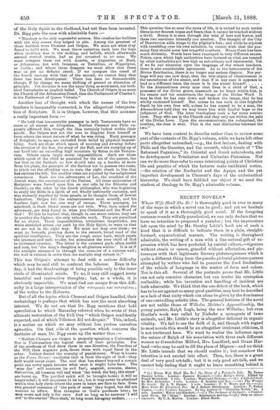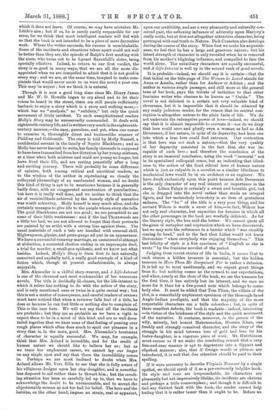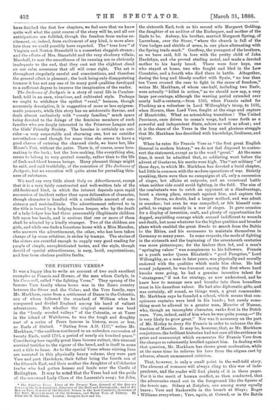RECENT NOVELS.* Whose Wife Shall She Be? is thoroughly good
in ever so many of the ways in which a novel can be good ; and yet we hesitate to speak of it as a thoroughly good novel. If the foregoing sentence sounds wilfully paradoxical, we can only declare that we have no intention to propound a paradox ; but the impressions left upon the mind by Mr. Stanley Little's book are of such a kind that it is difficult to indicate them in a plain, straight- forward, nnparadoxical manner. The writing is throughout admirable, the writing of a man with a fine natural gift of ex- pression which has been perfected by careful culture,—vigorous without strain or spasm, graceful without affectation, and pic- turesque with that legitimate literary picturesqueness which is quite a different thing from the pseudo-pictorial picturesqueness attempted by writers who fail to perceive the fixed limitations of the vehicle of language in the matter of form and colour. Nor is this all. Several of the portraits prove that Mr. Little can uot only conceive character, but can render his conception realisable ; while his invention and handling of incident are both admirable. We think that the one defect of the book, which has to be set against so many good qualities, may best be described as a lack of that unity which can alone be given by the dominance of one controlling artistic idea. The general features of the novel are not unlike those of Wilhelm Meister's Apprenticeship, the young painter, Ralph Legh, being the new Wilhelm ; but even Goethe's work was called by Niebuhr a menagerie of tame animals, and Mr. Little's story is altogether deficient in organic vitality. We fail to see the drift of it, and though with regard to most novels this would be an altogether irrelevant criticism, it is not irrelevant here. We want to realise the influence upon the nature of Ralph of his association with three such different women as Gwendoline Milford, Mrs. Landford, and Grace Har- land—who may be said to fill the place of Mignon—and we think Mr. Little intends that we should realise it ; but somehow the intention is not carried into effect. Then, too, there is a great deal of very good art-talk ; but it is only good art-talk, and we cannot help feeling that it ought to leave something behind it
g (1.) Whose Wife Shall She Bet Ll. Sfory of a Painter's Life. By James Stanley Little. London: Spencer Blackett.—(2.) Molly's Story. Edited by Frank Merrylield. 3 vols. London : Ward and Downey.—(3.) A .Lije-Interest. By Mrs. Alexander. 3 vole. London, B. Bentley and Son.—(4.) Um Woman He Loved. By A. N. Homer. 3 vols. London : F. V. White and 0o.—(3.) More Than He Bargained For. By J. Robert Hutchinson. London : T. Fisher Unwin.—(6.) Virginia Tennant. By the Author of Christina North," dm. 2 vols. London : Hurst and Blaokett.—(7.) The Jacksons of Tackgate a Cumber- land Story. By "Elms." London : Remington and Co.—(8.) Only an Acker. tisement. By C. L. Martin. London : Elliot Stock.
which it does not leave. Of course, we may have mistaken Mr. Little's aim ; but if so, he is surely partly responsible for our error, for we think that most intelligent readers will feel with us that the book is not intended to be a piece of mere decorative work. Where the writer succeeds, his success is unmistakable. Some of the incidents and situations taken apart could not well be better than they are, the episode of Ralph's first meeting with the siren, who turns out to be Lyonel Ravenhill's sister, being specially effective. Indeed, to return to our first verdict, the story is so good in many ways, that we are all the more dis- appointed when we are compelled to admit that it is not good in every way ; and we are, at the same time, tempted to make com- plaints that would never occur to us were the novel a poor one. This may be unjust ; but we think it is natural.
Though it is now a good long time since Mr. Henry James and Mr. W. D. Howells began to cry aloud and to let their voices be heard in the street, there are still people sufficiently barbaric to enjoy a story which is a story and nothing more,— which has no "analysis," no "subtlety," but only the quick movement of lively incident. To such unsophisticated readers Molly's Story may be unreservedly commended. It deals with eighteenth. century life, and is written very much in the eighteenth- century manner,—the easy, garrulous, and yet, when one comes to examine it, thoroughly direct and businesslike manner of Fielding and Goldsmith. The story is told by Molly Russell, a confidential servant in the family of Squire Blackburn ; and as Molly has never learned to write, her family chronicle is supposed to have been transcribed from her dictation by her young mistress, at a time when both mistress and maid are young no longer, but have lived their life, and are resting peacefully after a long and exciting journey. There will probably be some difference of opinion, both among critical and uncritical readers, as to the wisdom of the author in reproducing so closely the colloquial phraseology of an uneducated woman, and no doubt this kind of thing is apt to be wearisome because it is generally badly done, with an exaggerated accentuation of peculiarities ; but here it is really well done, and we incline to think that the air of verisimilitude achieved by the homely style of narrative was worth achieving. Molly herself is very much alive, and she certainly manages to give life to the people whose story she tells. The good Blackburns are not too good ; we are permitted to see some of their little weaknesses : and if the bad Thornwoods are a little too bad, we are not allowed to forget that their portraits are painted by an artist with a strong bias against them. The usual materials of such a tale are handled with unusual skill. Highwaymen, gipsies, and press-gangs all put in an appearance. We have a successful runaway marriage, an unsuccessful attempt at abduction, a contested election ending in an impromptu duel, a trial for murder, a small-pox epidemic, and we know not what besides. Indeed, Molly's Story is from first to last naturally conceived and capitally told, a really good example of a kind of fiction which, though at present unfashionable, is always enjoyable.
Mrs. Alexander is a skilful story-weaver, and A Life-Interest is one of the cleverest and most workmanlike of her numerous novels. The title is decidedly ill-chosen, for the life-interest to which it refers has nothing to do with the action of the story, and is only mentioned once or twice in a quite casual way; but this is not a matter of consequence, and careful readers of reviews must have noticed that when a reviewer falls foul of a title, he does so because he can find little or nothing else to complain of. This is the case here. We will not say that all the incidents are probable ; but they are as probable as we have a right to expect them to be in a novel of this kind, and are so well dove- tailed together that we have none of that feeling of passing over rough places which often does much to spoil our pleasure in a story that is, in the main, good. Mrs. Alexander's treatment of character is equally successful. We may, for example, think that Mrs. Acland is incredible, and for the credit of human nature we should like to believe her so ; but as we trace her unpleasant career, we cannot lay our finger on any single spot and say that there the incredibility comes in. Perhaps we are moat inclined to doubt when Mrs. Acland allows Mr. Vere Ellie to see that she is fully aware of his villainous designs upon her step-daughter, and is neverthe- less disposed to aid rather than to thwart him; but the revolt- ing situation has been so carefully led up to, that we have to acknowledge the doubt to be unreasonable, and to accept the objectionable woman as not too bad for belief. The hero and the heroine, on the other hand, impose no strain, real or apparent, upon our credibility, and are a very pleasantly and naturally con- ceived pair, the softening influence of adversity upon Marjory's really noble, but at first not altogether attractive character, being portrayed with real truth to Nature. Dick Cranston also develops during the course of the story. When first we make his acquaint- ance, we feel that he has a large and generous nature; but his latent strength of character is only revealed when he is removed from his mother's blighting influence, and compelled to face the world alone. The subsidiary characters are equally successful, and A Life-Interest is well up in the second rank of good novels.
It is probable—indeed, we should say it is certain—that the first initial on the title-page of The Woman he Loved stands for Anne or Amelia, rather than for Andrew or Adrian ; and the author in various single passages, and still more in the general tone of her book, pays the tribute of imitation to that other feminine writer who chooses to be known as " Oujda." The novel is not deficient in a certain not very valuable kind of cleverness, but it is impossible that it should be admired by any really judicious reader, for the reason that its central con- ception is altogether untrue to the plain facts of life. We do not underrate the redemptive power of love—indeed, we should say that it is almost impossible to overrate it—nor do we deny that love could save and glorify even a woman as bad as Ade. Devereaux, if her nature, in spite of its depravity, had been one into which a true love could find entrance. Our contention is that hers was not such a nature,—that the very quality of her depravity consisted in the fact that she was in- capable of such love ; and therefore the conclusion of the story is an immoral conclusion, using the word " immoral " not in its specialised colloquial sense, but as indicating that blind-
ness to the action of the fixed ethical laws of human nature which is just as culpable in a novelist as a similar blindness to mechanical laws would be in an architect or an engineer. We have dwelt exclusively upon this point because Ada Devereaux is the only character of any real interest or importance in the story. Lilian Fabyn is certainly a sweet and loveable girl, but she is dragged, into the novel rather than made an integral figure, and her melancholy love-story is an item of gratuitous sadness. The " he " of the title is a very poor thing, and his servant Wilson is worth a score of him,—in fact, Wilson has not only real character, but capacities for heroism in which all the other personages in the book are woefully deficient. As for the literary style, the less said the better. We cannot quote all the gems of metaphor and expression which we have discovered; but we may note the references to a barrier which "was steadily rearing its head," and to the fact that Lilian would not leave Devonshire "when everybody was enjoying themselves." This last felicity of style is a fine specimen of "English as she is wrote" by the feminine novelist of the period.
Judging from recent stories of life in India, it seems that to such stories a hidden treasure is essential ; but the hidden treasure in More Than He Bargained For is rather a delusion. It is led up to most assiduously, and we expect great things from it ; but nothing comes as the reward to our expectations, and when, nearly at the close of the book, we see the treasure for the first time, it has entirely lost its interest, and we care no more for it than for a five-pound note which belongs to some- body else. It must be added that Tom Flinn, the villain of the plot, is a remarkably unpleasant specimen of the thorough-faced Anglo-Indian profligate, and that the majority of the more respectable characters are a trifle colourless ; but, in spite of these manifest defects, the book is readable—indeed, interesting —in virtue of the briskness of the style and the quick movement of the narrative. It contains, moreover, in the person of the wily, miserly, but honest Mahommedan, Hoosein Khan, one freshly and strongly conceived character, and the story of the struggle in his mind between love of gold and love for his foster-daughter, is a vigorous piece of work. Mr. Hutchinson must excuse us if we make the concluding remark that a very free-and-easy manner is apt to degenerate into a flippant and slipshod manner ; also, that if foreign words or phrases are introduced, it is well that due attention should be paid to their spelling.
If it were necessary to describe Virginia Tennant by a single epithet, we should speak of it as a pre-eminently ladylike book. Its style and tone are irreproachable, its characters are pleasantly but not impressively lifelike, its incidents are obvious and perhaps a trifle commonplace ; and though it is difficult to find any distinct fault with the book, the reader cannot help feeling that it is rather tamer than it ought to be. Before we
have finished the first few chapters, we feel sure that we know quite well what the quiet course of the story will be, and all our anticipations are fulfilled, though the freedom from undue ex- citement, or. indeed, from excitement of any kind, is more abso- lute than we could possibly have expected. The " true love" of Virginia and Norton Stansfield is a somewhat sluggish stream ; and the efforts of Mrs. Stansfield and the very shadowy villain, Marshall, to mar the smoothness of its running are so obviously inadequate to the end, that they cast not the slightest cloud on our calm assurance that all will come right. The art is throughout singularly careful and conscientious, and therefore the general effect is pleasant ; the book being only disappointing because it has not any one of its many good qualities developed to a sufficient degree to impress the imagination of the reader.
The Jacksons of Jackgate is a story of rural life in Cumber- land, told in an easy, vivacious, and cultivated style. Perhaps we ought to withdraw the epithet "rural," because, though accurately descriptive, it is suggestive of more or less epigram- matic peasants, while this story has an aristocratic flavour, and deals almost exclusively with "county families," much space being devoted to the doings of the feminine members of such families who are deeply interested in the Primrose League and the Girls' Friendly Society. The heroine is certainly an out- sider —a very respectable and charming one, but an outsider nevertheless—and though for some time she seems to have a good chance of entering the charmed circle, we leave her, like Moore'e Pen, without the gates. There is, of course, some love- making in the hook; but the love-making, like everything else, seems to belong to very genteel comedy, rather than to the life of flesh-and-blood human beings. Many pleasant things might be said, and said truthfully, of the execution of The Jacksons of Jackgate, but no execution will quite atone for pervading thin- ness of substance.
We need say very little about Only an Advertisement, except that it is a very fairly constructed and well-written tale of the old-fashioned kind, in which the interest depends upon rapid succession of incident rather than upon delineation of character, though character is handled with a creditable amount of con- sistency and verisimilitude. The advertisement referred to in the title is issued by a lodging-house keeper, who by the death of a lady-lodger has had three presumably illegitimate children left upon her hands, and is anxious that one or more of them shall be adopted by a kindly stranger. Two of the children are girls, and while one finds a luxurious home with a Miss Marsden, who answers the advertisement, the other, who has been taken charge of by some relatives, is stolen by tramps. The stories of the sisters are eventful enough to supply very good reading for people of simple, unsophisticated tastes, and the style, though devoid of special attractiveness, is easy, lucid, unpretentious, and free from obvious positive faults.




































 Previous page
Previous page